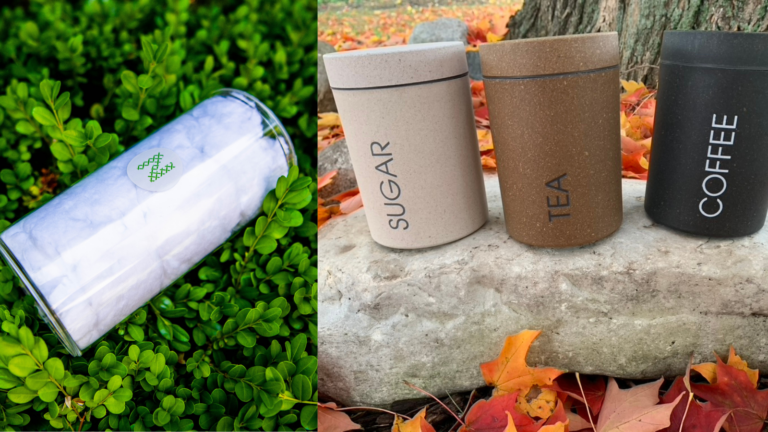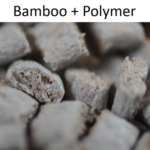
- Kim Kisner
- Business
- 11/01/2022
From Eco-Friendly Building Insulation to Reformed Plastic Home Goods, NexTiles and Pivot Materials are Working Toward Changing Lives

A hardworking number of Southeast Michigan manufacturing companies and hardware entrepreneurs are getting their start at the Centrepolis Accelerator, a nonprofit business facilitator providing access to key resources, a collaborative community, product development, and manufacturing experts with an impetus to keep manufacturing in Michigan. Launched in 2017 by Lawrence Tech, the City of Southfield, and the Michigan Economic Development Corp. (MEDC), the accelerator focuses largely on the areas of climatech, cleantech, and the circular economy.
SBN Detroit spoke with two woman-owned sustainability businesses working with Centrepolis to gain insights on the whys and the hows regarding their industry choice, go-to-market objective, and their start-up paths and challenges.
NexTiles, a Black-, woman-owned Detroit-based textile recycling, and secondary use company uses textile waste from Detroit’s automotive and apparel manufacturing industries to make eco-friendly building insulation that can reenter the circular economy at the end of its life. The founder and CEO is Madeline Miller.
Pivot Materials is a millennial-woman-owned Detroit-based social impact business that specializes in providing sustainable biomaterials by upcycling agricultural waste, including bamboo fibers and rice and coffee hulls. The co-founder and CEO is Kylee Guenther.
Q: How did the concept of your business come about?
Miller:
I was at the University of Miami doing my graduate studies in marine and atmospheric science. My undergrad was in environmental science, and I didn’t know exactly what I wanted to do with my education, but I started studying ocean plastics and then landfill waste and developed an understanding of manufacturing overconsumption and the waste it creates.
I then started an internship with a New York-based textile recycling company and began brainstorming secondary uses for this textile waste. I came up with the insulation concept and it stuck. I’ve now been able to combine my Ph.D. research at the University of Michigan School for Environment and Sustainability around the energy burden with the corresponding demand for insulation. It’s been an awesome fit and direction for me.

Guenther:
My co-founder Raju Patil and I combined our childhood experiences into the mission of our business, Pivot Materials. I’m the second generation in my family to work in Michigan’s plastics industry. I grew up on the shop floor learning about plastics from the bottom up. I’m so proud of my dad and his career, which spanned about four decades in the plastics industry, but even as a kid I was mortified by the amount of waste he helped create.
Raju grew up the son of a rice farmer in rural India and had similar feelings about the waste created by the agricultural industry. One-third of all black carbon emissions globally are created by crop burning.
We thought we could work on both issues together so we started using agricultural waste to reduce plastic usage while also reducing the amount of agricultural waste that gets burned or sent to landfill.
Q: Why sustainability?

Miller:
Textile waste consumption needs to be slowed drastically and the overwhelming amount of manufacturing waste in the atmosphere needs to be addressed. Our natural resources are being impacted and people are being impacted. They will continue to suffer if we don’t slow down.
I want to change lives for Detroiters by using locally manufactured building insulation to create clean jobs, decrease the utility burden on families, increase diversity in the energy industry, divert textile waste from landfills, and contribute to the growth of the circular economy.
Guenther:
I often repeat in my head “be the change you want to see in this world,” and that’s driven my passion for sustainability. I think it’s absurd that only about 9% of all plastics created get recycled.
I also know that plastics aren’t going anywhere. They’re too embedded in our lifestyles and plastic makes a lot of money for a lot of people. So, my passion is to transition away from as much plastic usage as well as other non-sustainable materials while also helping reduce the environmental impact of agricultural waste.
Q: Please walk us through your start-up process and your work with Centrepolis.
Miller:
When I transitioned from Miami to Detroit and had the idea to start the business, I began working with TechTown Detroit. They familiarized me with customer discovery process and helped me to identify challenges and opportunities for my business.
Centrepolis has been extremely helpful in the product development process. After we got over the hump of exactly what we wanted to make, Centrepolis came in and helped me identify a plethora of resources, including warehouse space, equipment, product treatment packaging, and marketing.
Guenther:
I’m really happy to see that Dan Radomski, executive director of Centrepolis started an accelerator specifically for product-based companies. This has been missing in the ecosystem.

For us, I think the biggest benefit from Centrepolis has been working with our mentor and Expert-in-Residence, Richard Broo.
Richard is a plastics industry veteran with about 40 years of experience in material sciences and project management. Sometimes we have an issue that we think is huge, and he can solve our problem in about two seconds and reassure us that it’s no big deal. This helps us save a lot of time as we grow our business, and it gives us someone to learn on.
Q: Are you focused on business-to-business or business-to-consumer?
Miller:
I work with both. The first part of my business is waste collection and recycling. Here I focus on the automotive and textile industries, so this is B2B. A portion of that waste is then upcycled into eco-friendly insulation, a product I ultimately plan to sell to consumers.
Guenther:
We’re B2B. We sell our materials to brand owners and manufacturers who already use plastics or are looking to create a greener new product.
Q: What are your biggest challenges?
Miller:
Communicating the value of our business to manufacturers is one of our biggest challenges. There is so much volume when it comes to waste, and it’s cheaper to take it to a landfill than to collect and process it into a new product. Some companies are at the forefront of diverting waste from landfills and some are not. It can be difficult to communicate the value and remain price competitive when it comes to engaging new businesses.
Guenther:
Like many businesses, COVID and its aftermath have been our biggest challenge. With our name being Pivot, we also had a bit of a pandemic “pivot.” My co-founder and I launched another business called Loopy Products.

Loopy Products is a sustainable home and housewares line that provides our customers with the products they need to live their best lives, sustainably. All the products contain upcycled agricultural waste and less plastic and other hard-to-recycle materials such as ceramic or hard-to-recycle materials like glass.” I’m proud of us for finding a new way to get more sustainable materials in front of more people.
Q: How do you think your business impacts Southeast Michigan businesses and residents when it comes to sustainability?
Miller:
We encounter many companies in Southeast Michigan who have been looking for textile recycling and haven’t been able to find a solution. So, it’s exciting to know that we are meeting a unique demand.
Also, as a Black woman-owned business, I hope to be an example and inspiration to high school and college young people interested in sustainability and looking to identify points of entry. I was that young high school girl, and I almost lost hope. So, I want to make an impact throughout the local community by telling my story to people who look like me and aspire to have careers in sustainability.
Guenther:
Southeast Michigan has been at the forefront of manufacturing forever.
Having a company like Pivot in the area helps Michigan to be at the forefront of the evolution of sustainable materials. This is no longer just an added benefit to products, it’s an expectation, especially for millennial and Gen Z communities.
Be sure to subscribe to our newsletter for regular updates on sustainable business practices in and around Detroit.
Kim Kisner
- All
- Business
- Community
- Education
- Events

Unique Monique Scented Candles, a Detroit-based business founded by Monique Bounds., aims to produce candles and household products with clean ingredients and local supply chains. What began as a personal hobby during college has evolved into a full-time venture producing coconut oil and soy-based candles made with essential oils and locally sourced materials. SBN Detroit interviewed Bounds about launching a sustainable product line, sourcing challenges in Michigan, and...

Eastern Market Partnership, in collaboration with the City of Detroit’s Office of Sustainability Urban Agriculture Division, has announced $240,000 in grant funding to support Detroit-based farmers and farmer collectives. The grants will advance food access, climate education, sustainable land use, and economic opportunity, with priority given to Black- and Indigenous-led farms, youth-led initiatives, and projects rooted in historically disinvested neighborhoods. The recipients – ranging from cooperatives and community...

Citizen Robotics is a Detroit-based nonprofit that advances the use of robotics and digital manufacturing in residential construction, focusing on improving productivity, sustainability, and long-term affordability. Best known for its early work in 3D-printed housing, it explores how alternative construction methods and new financial models can reduce material waste, lower lifetime operating costs, and enhance the resilience of homes. SBN Detroit interviewed Tom Woodman, founder and president of...







